What Temperature is Fever in Baby
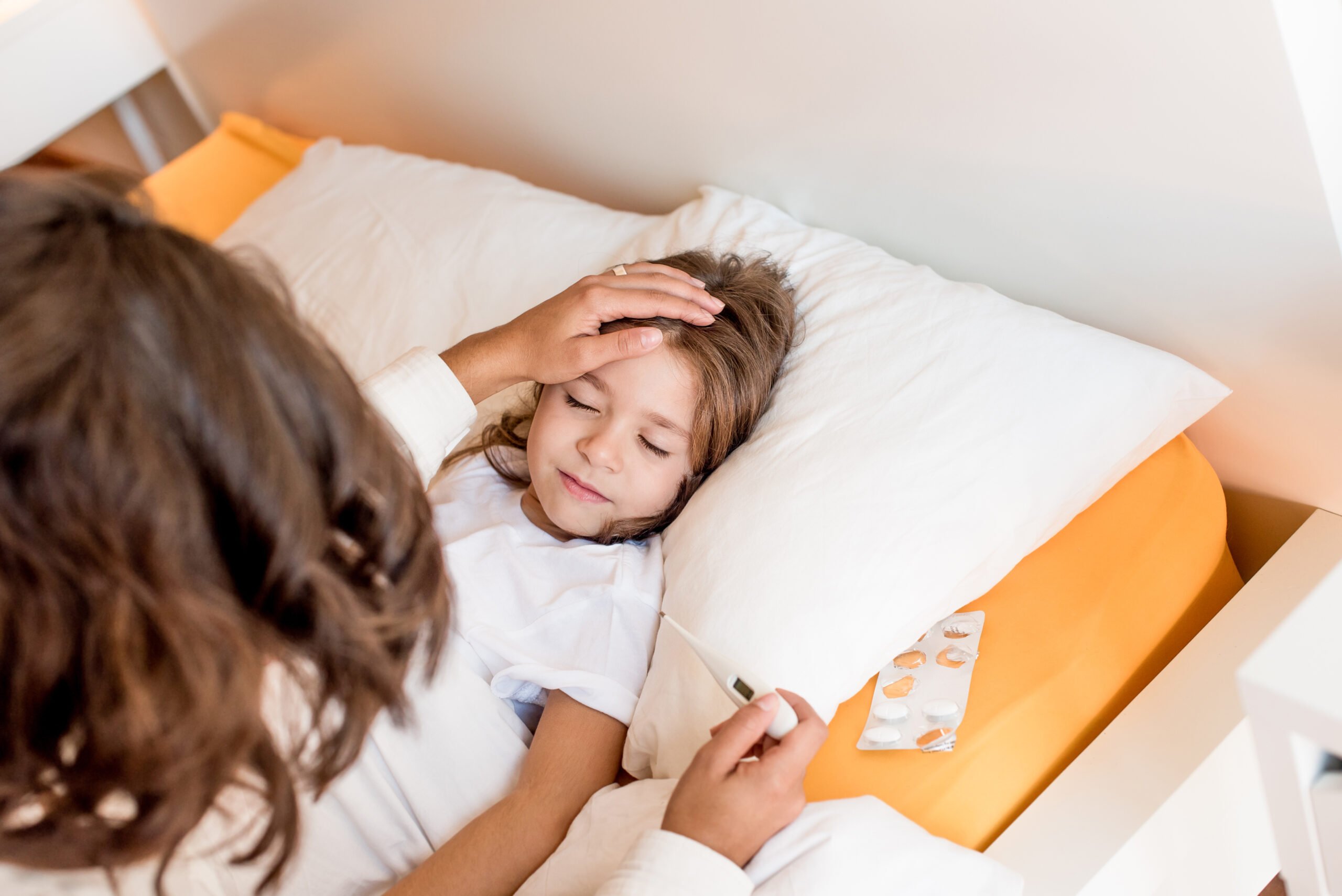
As a parent seeing your little ones unwell with a fever can be really worrying. There are lots of causes of fever in children, everything from common colds and flus to vaccinations and bacterial infections. It is safe to treat most fevers at home. Here are our parents' top tips on how to safely treat a fever in babies and children.
Measure Temperature Regularly
A fever is any rise in the core body temperature above 38°C or 100.5°F. Babies and children can have a pretty dramatic rise in their temperature even with a simple cold or flu, but as a rule of thumb, the higher and more persistent the temperature the more serious the illness.
It’s important to get medical advice if your baby has a temperature over 39°C or 102°F.
So it's important to get regular and accurate measurements of temperature. Keep a working digital thermometer at home and measure a fever regularly; at least every 1-2 hours while it is high and 20-30 minutes after giving any medication.
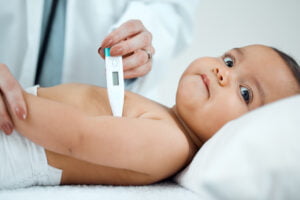
Use an underarm or rectal thermometer in babies up to 6 months. For older children you can use either an underarm or in-ear thermometer.
Follow the instructions, placing the thermometer firmly in the ear or against the skin. You might need to use distraction with a toy, book or video and get help to get an accurate reading.
Natural Methods to Reduce Fever
It’s helpful to remember that when your little person has a fever their body is actively trying to make itself hot. It’s a natural (and pretty clever!) way your bfor the body to become an unfriendly place for the bug that’s infected them, so it can get rid of them. That said, having a fever makes you feel pretty rubbish.
Keeping the environment cool by opening a window, turning the heating down and using light clothing can help to make your little person feel more comfortable and not worsen a fever. Doctors don’t recommend things like cold baths or wet towels and clothes on the skin as these have not been found to safely and effectively reduce temperature.
Stay Hydrated
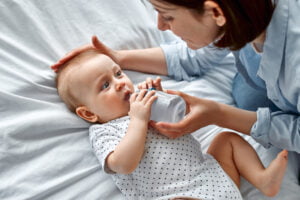
It’s normal to eat and drink less than usual when you’re under the weather, and as Paediatricians we don’t worry too much about children who haven’t eaten much for a day or two. What we do worry about is whether a baby or child is drinking, because little ones who aren’t able to drink can become dehydrated pretty quickly.
Offering drinks little and often is the key. You can try small amounts on a spoon, syringe or bottle every 20-30 minutes. Juice or milk is fine if that’s what they prefer. You can also offer snacks and fruits that will provide energy and salts alongside fluids. Fruit-based ice lollies are an excellent option to give water and energy, and can also help to bring the fever down.
And if your little one is really struggling to drink you should look out for signs of dehydration. The most obvious sign is reduced urine production. It’s normal for urine to be yellow and stronger smelling than usual when unwell, but your child should still be having at least 6 wet nappy in 24 hours. If your child does not wee or have a wet nappy for over 12 hours you should get medical advice as they may be dehydrated.
Use Medicines Safely
There are two medicines that you can safely use to treat a fever in babies and children: these are paracetamol (also called acetaminophen) and ibuprofen. There are lots of brands available for children, like Calpol and Nurofen; they all include one of these two ingredients.
These medicines are very safe when given according to the instructions, which you can find on the bottle or packaging. Keep a note of the time and amount you give so you can keep track and not exceed the maximum recommended doses. Doctors don’t recommend giving other medicines like aspirin to children.
It can take some time for the fever-fighting effects of these medicines to kick in, typically 30-45 minutes. Once it’s responded the fever should not return for at least 3-4 hours. Paracetamol and ibuprofen work in different ways, you can give them together or alternate them to get the maximum fever-fighting effect.
A fever that stays high (over 39°C or 102°F) or returns within less than 1 hour despite medicine is a worrisome sign and you should get medical advice in this case.
Signs of Serious Illness
Fevers are very common in childhood. Most fevers are caused by viral illnesses like colds and flus that the body can fight off. These infections can’t be treated with antibiotics, which only work on bacteria. But in a small number of cases fevers can be caused by more serious illnesses like severe viral or bacterial infections. There are a few signs you can look for to help identify these serious illnesses and you should seek medical advice urgently if you see any of them.
Rash that Doesn't Disappear
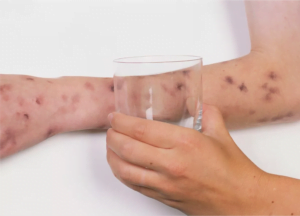
The first is a rash that doesn't disappear when the skin is stretched or under the pressure of a glass. Also called a non-blanching rash, which means that the rash does not disappear when the skin is stretched or pushed under a glass (sometimes called the ‘glass test’) as shown here. This is a sign of severe bacterial infection like meningitis. Other types of rashes can happen with viral illnesses, but if you are unsure you should get medical advice if your child has a rash and fever.
Neck or Body Stiffness
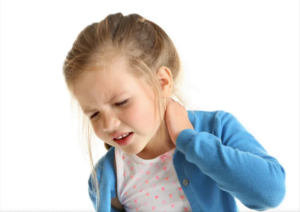
The second is signs of brain irritation. These include include stiffness of the neck or body, a strong desire to avoid light, agitation or confusion. These are all signs that the brain is being affected by infection and you should seek urgent medical advice.
Signs of Shock
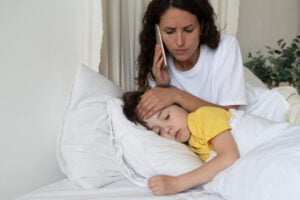
Finally there are signs of shock (severely low blood pressure). Look for drowsiness, floppiness or if your little one is hard to wake up. Their skin may be blue, pale or blotchy and their hands and feet cold to touch. They can have fast or abnormally deep breathing.
It’s worth knowing that these are all very rare in babies and children but if you are unsure and worried you should always seek medical advice.
We hope you found this article useful. Did you know that the Poppet community is a great place to find more helpful tips and resources for your family as well as flexible childcare from local parents and approved providers, all at the touch of a button. Register here today!
And here’s a list of other great resources to keep your family healthy and well
https://www.healthychildren.org/
https://www.nidirect.gov.uk/conditions/childhood-illnesses
https://www.sja.org.uk/get-advice/first-aid-advice/paediatric-first-aid/
https://firstaidchampions.redcross.org.uk/primary/first-aid-skills/
https://www.healthhub.sg/programmes/183/parent-hub
Disclaimer: This article is for education purposes and does not constitute medical advice. You should seek advice from a trained medical professional if you have concerns about your child’s health.

